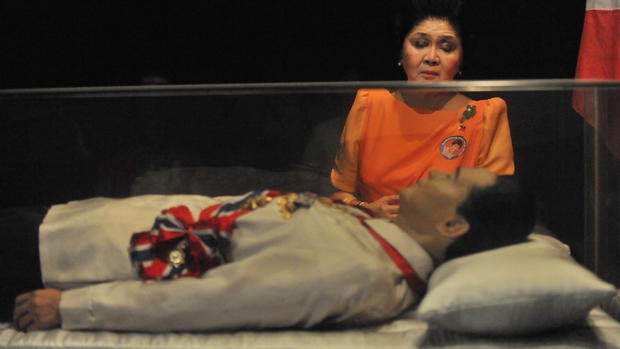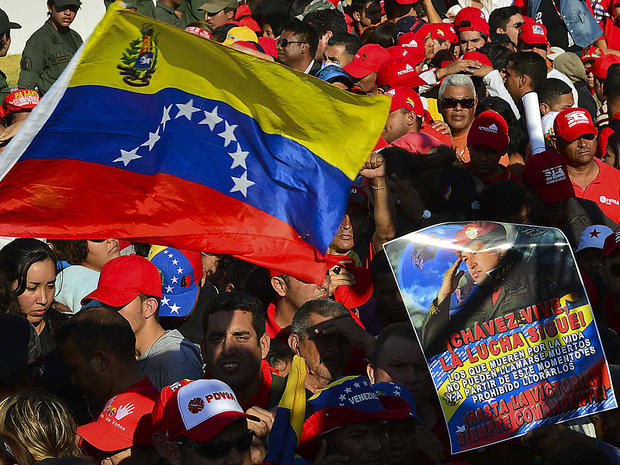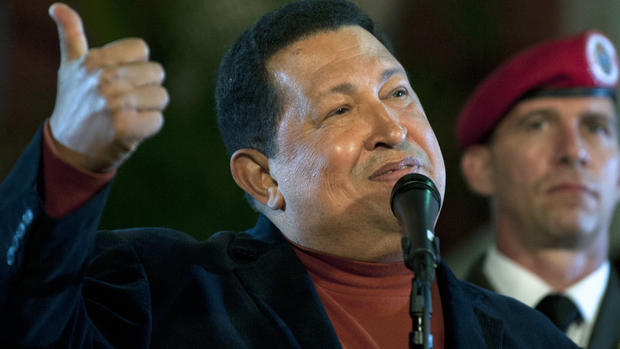Hugo Chavez's funeral attracts world leaders
Last Updated 1:53 p.m. ET
CARACAS, Venezuela World leaders, athletes and left-wing celebrities gathered at a music-filled state funeral honoring Venezuelan President Hugo Chavez on Friday, with multitudes waiting outside, the start of a day that will end with the swearing in of his hand-picked successor as interim president.
The funeral at a military academy where Chavez has been lying in state began with Venezuela's national youth orchestra singing the national anthem, led by famed conductor Gustavo Dudamel. A government-allied congressman later belted out cowboy songs from Chavez's native Barinas state.
The streets outside took on a carnival atmosphere, with military bands launching into marches and an expanse of supporters wearing the red of Chavez's socialist party. Street vendors sold paper replicas of the presidential sash, which many people in the line slipped over their shoulder.
Throngs watched the ceremony on huge monitors under the blazing sun, with some complaining of a lack of bottled water and bathroom facilities. A line to see Chavez's body stretched 1.5 miles, was halted as the funeral got under way.
In the funeral hall, more than 30 political leaders including Cuba's Raul Castro and Iran's Mahmoud Ahmadinejad stood at attention before Chavez's flag-draped coffin. Many of them were welcomed by Nicolas Maduro, the vice president who will later be sworn in as interim president. The glass-topped coffin, which has been open since Wednesday, was shut for the funeral.
U.S. Rep. Gregory Meeks, a New York Democrat, and former Rep. William Delahunt, a Democrat from Massachusetts, represented the United States, which Chavez often railed against even as he sold the country billions of dollars in oil each year. Television cameras captured Hollywood star Sean Penn in attendance, while the Rev. Jesse Jackson preached rapprochement between the U.S. and Venezuela.
"We pray God today that you will heal the breach between the U.S. and Venezuela," Jackson said.
- Chavez body to go on permanent display
- Venezuela: Maduro to take oath as acting president
- Chavez's body returns "home" to military academy
- Hugo Chavez died of massive heart attack: top general
- Grand pageantry expected for mourning of Chavez
- From botched coup to top boss, key Chavez moments
Ahmadinejad won one of the biggest rounds of applause received by leaders entering the funeral. In fact, the guest list reflected Chavez's foreign policy of befriending countries such as Iran and Syria in conflict with the U.S. and Europe. Representatives from both north and south Koreas also attended.
"It is a great pain for us because we have lost a friend," Ahmadinejad said upon his arrival at the airport the night before. "I feel like I have lost myself, but I am sure that he still lives. Chavez will never die. His spirit and soul live on in each of our hearts."
With much of the world watching, Maduro delivered a fiery speech repeating some of the aggressive rhetoric he had used just hours before announcing Chavez's death Tuesday.
"Here you are commander with your men, standing, all your men and women, loyal as we swore before you, loyal until beyond death," Maduro shouted, his voice breaking with emotion. "We have smashed the curse of betrayal of the country and we will smash the curse of defeat and regression."
On Thursday, Maduro announced it would embalm Chavez's body and put it on permanent display, a decision that touched off strong passions on both sides of this deeply divided country, which Chavez ruled for 14 years before succumbing to cancer on Tuesday, at the age of 58.
Most of the normally traffic-choked streets of Caracas were empty, with schools and many businesses shuttered. The government also prohibited alcohol sales. Many Venezuelans, particularly Chavez supporters, said they were caught up in the pomp and circumstance of the past few days, and flattered to be the subject of world's attention.
"This is historic ...I have never seen anything like it," said Edila Ojeda, a 57-year-old janitor. "He was a world leader recognized internationally. I am speechless. It is impressive."
Others said they were put off by what they saw as excess, particularly the plan to put Chavez's body on display.
"He was a president, and I would say not a good one. Not a hero," said Gloria Ocampos, a retired office manager. "He should be buried, just like any other president. They are treating him like he was the father of the country ... It's crazy."
The government gave national and international media no direct access to the funeral, a measure of the strict control with which Chavez and his top lieutenants have controlled the country for years. On Thursday, Foreign Minister Elias Jaua appealed to local media not to publish critical political analyses "which could be a provocation for a pained people."
Following the funeral, National Assembly Speaker Diosdado Cabello was to swear in Maduro as interim president, as Chavez desired, despite complaints by the opposition that Cabello is the rightful holder of that post under the constitution. Cabello announced that the swearing-in will be held at the same military academy complex where Chavez's body is lying in state. Normally, presidents in Venezuela are sworn in at the National Assembly.
In announcing the opposition boycott, spokesman Angel Medina said that Maduro's ascension is "a violation of the constitutional order."
"Venezuelans should walk along the path of constitutionality. Today, more than ever we reject that they use the name of the president of the republic, who today is being buried, for political ends," he said. Critics believe Venezuela's 1999 charter stipulates that the speaker of the National Assembly take power in the event of a presidential death.
The constitution says elections must be held within 30 days of Chavez's March 5 death, though the government has not set a date. Maduro has announced he will be the candidate of Chavez's ruling socialist party against likely opposition candidate Henrique Capriles, and many expect him to ride the wave of emotion following Chavez's death to victory.
Friday's funeral promises a climax to three days of ceremony that have followed Chavez's death, and Venezuelan media were filled with commentary about the outsized place the late leader held on the world stage. Jaua said countries from Cuba to China to Iran had declared days of national mourning for Chavez, highly unusual for the leader of another country.
For many Chavez supporters, and the political insiders he left behind, the task ahead will be continuing the president's political movement beyond his death.
Maduro announced Thursday that the late president's body will be embalmed and forever displayed inside a glass tomb at a military museum not far from the presidential palace from which he ruled. Analysts said the perpetual display was meant to keep Chavez's power structure alive, long after his death at age 58.
"Nicolas Maduro and his government are building an aura that makes it very difficult, I would say, that in the future, the opposition tries to promote an alternative to the government," said Oscar Valles, a political analyst at the Metropolitan University in Caracas.
Heart-broken supporters were clearly in favor of the effort.
"We must think about the future and how we are going to guarantee the continuity of the revolution," said Rolando Tarazon, a street vendor who was waiting with his wife to see Chavez's body lying in state at the military academy late Thursday.
Chavez was particularly beloved by the poor, whose lot he championed. But critics say he left his successors a monumental task, with inflation of more than 20 percent a year, and public debt quadrupling to more than $100 billion. Crime is endemic and Chavez's chaotic management style has been blamed for a breakdown in infrastructure, particularly in the key oil industry.
Yet for some lined up to see Chavez's body early Friday, the road ahead meant keeping the late leader's legacy alive.
"Chavez, we swear to you, we'll vote for Maduro!" they chanted.


